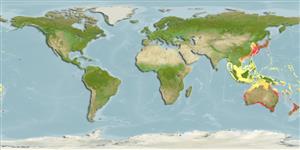Environment: milieu / climate zone / depth range / distribution range
بوم شناسي
دريايي; لب شور وابسته به آب سنگ; اقیانوس رو (Ref. 51243); تغييرات عمق 0 - 200 m (Ref. 28569). Subtropical; 44°N - 47°S, 90°E - 175°W
Indo-Pacific: widely occurring off New Zealand, Australia, Philippines, Indonesia, China, Taiwan, and Japan. Populations in the northern and southern hemispheres are independent and isolated but were similar enough to be declared one and the same species (Ref. 28569, 28591).
Length at first maturity / Size / Weight / سن
Maturity: Lm 26.2, range 20 - 28 cm
Max length : 130 cm TL جنس نر / بدون خواص جنسي; (Ref. 2334); common length : 40.0 cm TL جنس نر / بدون خواص جنسي; (Ref. 3243); بيشينه وزن گزارش شده: 20.0 kg (Ref. 28591); بيشينه سن گزارش شده: 54 سال ها (Ref. 92924)
Inhabit rocky reefs (Ref. 9702). Also occur in estuaries (Ref. 9563). Juveniles mainly inhabit inlets, bays and other shallow, sheltered marine waters, often over mud and seagrass (Ref. 6390). Small fish measuring less than 30 cm TL are common inshore around reef areas often in groups of around 30 individuals. Larger fish are shy and are less frequently seen (Ref. 26966). Adults often live near reefs, but are also found over mud and sand substrates (Ref. 6390). They are relatively sedentary. However, tagging studies have shown them capable of substantial migrations (Ref. 28591). Crustaceans (crabs, shrimps, etc) form the basis of the diet, but marine worms, starfish, sea urchins, shellfish and fish are also important (Ref. 28591). Not commercially cultured at present but considered as a prime aquaculture candidate (Ref. 28590). Maximum estimated age for SW Pacific is 54 years with validated longevity on the order of 40 years based on minimum age from bomb radiocarbon dating (Ref. 92924; Allen Andrews, pers.comm. 01/13). It is parasitised by the monogenean Anoplodiscus cirrusspiralis on the fins and body surface (Ref. 124057).
Mature adults form large schools in preferred spawning areas (Ref. 6390). They are serial spawners (Ref. 6390). Spawning generally occurs in waters less than 50 m deep (Ref. 6390). They generally only spawn when water temp is equal to 18°C (Ref. 6390).
There have been no investigations of sex reversals in Australian snapper populations. However, in New Zealand, some juvenile snapper change sex from female to male but all such changes are completed by the onset of maturity (Ref. 28040).
Paulin, C.D., 1990. Pagrus auratus, a new combination for the species known as "snapper" in Australasian waters (Pisces: Sparidae). N.Z. J. Mar. Freshwat. Res. 24(2):259-265. (Ref. 28569)
وضعيت در فهرست قرمز IUCN (Ref. 130435)
خطر برای انسان ها
Harmless
استفاده انسانی
ماهي گيري – شيلات: تجاري; آبزي پروري: آزمايشي; ماهي ها ي سرگرم كننده: بله
ابزارها
گزارش های ويژه
بارگيری XML
منابع اينترنتي
Estimates based on models
Preferred temperature (Ref.
123201): 14 - 25.2, mean 17.4 °C (based on 293 cells).
Phylogenetic diversity index (Ref.
82804): PD
50 = 0.5156 [Uniqueness, from 0.5 = low to 2.0 = high].
Bayesian length-weight: a=0.02188 (0.01250 - 0.03829), b=2.97 (2.82 - 3.12), in cm total length, based on LWR estimates for this species & (Sub)family-body (Ref.
93245).
Trophic level (Ref.
69278): 3.6 ±0.2 se; based on diet studies.
جهندگی (Ref.
120179): پايين ، كم, كمينه زمان لازم براي دو برابر شدن جمعيت 5/4 – 14 سال (tmax=11).
Prior r = 0.34, 95% CL = 0.23 - 0.52, Based on 3 full stock assessments.
Fishing Vulnerability (Ref.
59153): High to very high vulnerability (69 of 100).
Climate Vulnerability (Ref.
125649): High vulnerability (60 of 100).
Nutrients (Ref.
124155): Calcium = 12 [5, 25] mg/100g; Iron = 0.581 [0.194, 1.769] mg/100g; Protein = 20.8 [19.1, 22.7] %; Omega3 = 0.139 [0.067, 0.297] g/100g; Selenium = 24.5 [10.4, 61.8] μg/100g; VitaminA = 18.4 [3.6, 93.0] μg/100g; Zinc = 0.569 [0.277, 1.225] mg/100g (wet weight);
